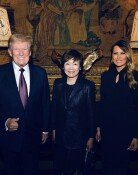Building a Golf Course Needs 780 Approvals
Building a Golf Course Needs 780 Approvals
Posted January. 30, 2008 03:29,
Passing 251 regulations and receiving 780 approvals are mandatory to establish a golf course in Korea.
It shows that the nations excessive regulations on golf courses have not improved for the past four years. The government barely reduced the number of regulations. To establish a golf course, we have to receive 780 approvals, said Park Yong-seong, a former chairman of the Korean Chamber of Commerce and Industry, during the meeting of the heads of economic associations, presided by then prime minister, in October 2003.
Some experts predicted that Koreas golf industry will gradually lose its competitiveness and the nations golf tour deficit will reach 10 trillion won by 2015 due to heavy tax burden on golf course operators who have to pay 40 percent of its sales as tax.
The presidential transition committee indicated the seriousness of the nations service deficit stemming from overseas golf tours and analyzed the status of local golf industry.
○ Golf Courses Surrounded by a String of Regulations
According to the Korea Golf Course Business Association (KGBA) yesterday, there are about 54 laws related with golf courses and additional 251 regulations dealing with location, procedures, and facilities.
The process of building a golf course is largely divided into five stages: making decisions on urban planning facilities, executing variety of studies which analyze the impact of the golf course, sanctioning construction plan, carrying out construction and finalizing permit for the building completion. The five-stage golf course construction business needs 26 cases of decisions, approvals, and permissions.
The golf course industry estimates that it needs additional three or four years excluding the period spent on building a golf course to pass through all complex processes and regulations.
A constructor preparing to build a golf course out of Seoul said, Since early 2006, I have visited the provincial office once a week and the city government three or four times a week in order to ask government officials to speed up their document review process. It is shameful to even mention competitiveness.
The approval process has been delayed and has become complicated due to the overlapping review process. Certainly, city government, provincial government, and local environmental agency review similar documents at each stage of the approval. Only if the overlapping processes are eliminated, more than six months can be curtailed, the constructor criticized.
An official of the KGBA said, The Chinese government has created policies to support golf courses and Japans local governments created a Task Force to support golf courses.
○ Eroding International Competitiveness Due to Tax Burden
Out of 75 to 110 billion won required to build an 18-hole golf course, tax and additional charges amount to 15 to 20 billion won. They include acquisition tax, registration tax, value added tax, development charge and alternative forest resource fund.
The local golf courses in operation spent 41.9 percent of their sales as property tax, special excise tax and sports promotion funds in 2006.
Burdened by heavy regulations, the competitiveness of Koreas golf industry continuously showed a downward streak.
Foreign golfers visiting Koreas golf courses decreased drastically from 140,000 in 2000 to 60,000 in 2006 while Korean golfers visiting overseas golf courses soared from 550,000 to one million over the same period.
Koreas weak price competitiveness caused such result as China released golf packages consisting of roundtrip airfare, accommodation fee, and three rounds of golf games at 700,000 won and Southeast Asian nations serviced the same golf tour package at 650,000 won while the price for playing three rounds in Korea reached 750,000 won.
The transition committee explained, Golf cannot be viewed as a luxurious sport played only by people in higher income brackets. We just reviewed the current status of the local golf industry in order to find measures to encourage Korean golfers going overseas to head for local golf courses.
cha@donga.com
Headline News
- Joint investigation headquarters asks Yoon to appear at the investigation office
- KDIC colonel: Cable ties and hoods to control NEC staff were prepared
- Results of real estate development diverged by accessibility to Gangnam
- New budget proposal reflecting Trump’s demand rejected
- Son Heung-min scores winning corner kick







